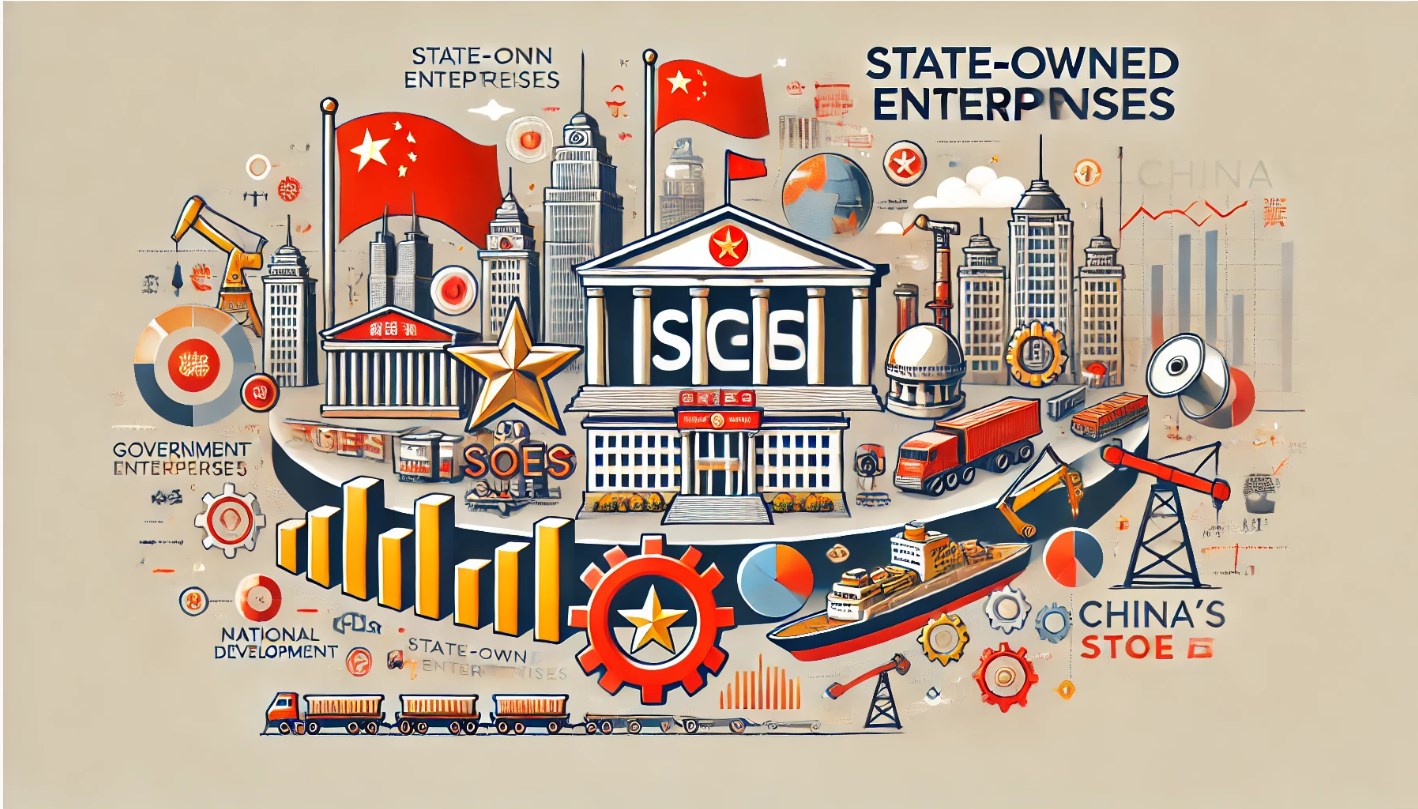China’s private enterprises have undergone significant transformations over the past few decades, playing an increasingly critical role in the country’s economy. While the state-owned sector historically dominated China’s industrial landscape, private businesses have risen to become key drivers of innovation, job creation, and economic diversification. Today, private enterprises contribute substantially to China’s GDP, employment rates, and global economic influence.
The rise of private enterprises in China reflects the broader economic reforms and shifts that have occurred since the late 20th century, especially following the introduction of the “Open Door” policy and market-oriented reforms initiated by Deng Xiaoping in the late 1970s. These reforms allowed the private sector to flourish, leading to a surge in entrepreneurial activity, the establishment of small and medium-sized enterprises (SMEs), and the emergence of global corporations.
The Evolution of Private Enterprises in China
Early Stages: State-Controlled Economy
For much of China’s modern history, the government maintained tight control over economic activity. Under the leadership of Chairman Mao Zedong, the country followed a command economy model, with most industries, agriculture, and resources controlled by the state. Private enterprises, when they existed, were small, informal, and often subject to stringent regulation and control.
After the founding of the People’s Republic of China in 1949, the government nationalized most private businesses, which resulted in a state-controlled economy. The collectivization of agriculture and the emphasis on large state-owned enterprises (SOEs) in sectors such as steel, energy, and transportation further centralized economic power in the hands of the state.
Reform Era: Opening Up and Market Liberalization
The shift towards private enterprise began with the market reforms initiated in 1978 under the leadership of Deng Xiaoping. These reforms allowed for the creation of private businesses, especially in the form of small and medium-sized enterprises (SMEs), alongside the opening up of markets to foreign investments and joint ventures. Private businesses were first permitted in agriculture, with the introduction of the Household Responsibility System, which allowed farmers to sell surplus production after fulfilling state quotas.
In the early 1980s, the government introduced special economic zones (SEZs) like Shenzhen, which became testing grounds for private businesses and foreign investments. The establishment of these zones encouraged private enterprise by offering lower taxes, less regulation, and access to global markets. This marked the beginning of a transition from a command economy to a more mixed model, where private businesses could coexist alongside state-owned enterprises.
The Rise of Large Private Corporations
By the 1990s and 2000s, China’s private sector had grown considerably, with an increasing number of enterprises expanding into large-scale industries such as manufacturing, technology, retail, and services. The liberalization of the economy and the increasing integration of China into the global economy played a significant role in this development. As China’s private enterprises began to expand and modernize, they made significant strides in global markets, with many companies taking advantage of China’s vast labor pool, low production costs, and emerging consumer base.
Private companies such as Alibaba, Huawei, Tencent, and Xiaomi became emblematic of China’s entrepreneurial spirit and its ability to innovate and scale on the global stage. These firms, initially small startups, grew into massive conglomerates that now compete globally in sectors ranging from e-commerce and telecommunications to electronics and entertainment.
Key Characteristics of China’s Private Enterprises
Diversity in Size and Scope
China’s private enterprises are diverse in size and sector, ranging from small family-owned businesses to large multinational corporations. The vast majority of private companies in China are small and medium-sized enterprises (SMEs), which are responsible for a significant portion of employment in urban and rural areas. These SMEs often focus on niche markets and rely on regional supply chains and consumer bases.
At the same time, the country has seen the emergence of powerful private conglomerates in industries such as technology, finance, real estate, and manufacturing. These companies, often referred to as “private giants,” play a significant role in both the domestic and global economies, and many have established themselves as major players on the world stage.
The diversity within China’s private sector reflects the country’s broad economic base, with private businesses spanning numerous industries, including technology, e-commerce, real estate, manufacturing, and consumer goods. This allows private enterprises to thrive in both the global marketplace and within China’s rapidly expanding internal economy.
Entrepreneurial Spirit and Innovation
A key defining feature of China’s private enterprises is their entrepreneurial drive and innovative capabilities. In the past few decades, China has rapidly become a global leader in sectors such as e-commerce, fintech, electric vehicles, and renewable energy, largely due to the entrepreneurial spirit that has characterized the private sector.
Innovation has been a critical factor in this rise. Private companies have embraced new technologies and business models, often leapfrogging traditional stages of development. For example, in the realm of e-commerce, Chinese companies such as Alibaba and JD.com have led the world in adopting mobile payments, social commerce, and live-streaming sales techniques. Additionally, private enterprises in technology have driven China’s rise as a global leader in 5G technology, artificial intelligence (AI), and renewable energy solutions.
Government Relations and Regulation
While China’s private enterprises have experienced considerable growth, they operate within a unique and sometimes challenging regulatory environment. The government plays a significant role in regulating and guiding the private sector, even as it supports entrepreneurial activity. Private companies often face the challenge of balancing their business ambitions with the expectations and requirements set forth by the government.
The relationship between the private sector and the government in China is often described as one of “co-opetition,” where businesses must collaborate with the state while simultaneously competing in the market. For instance, in certain industries like telecommunications and finance, private companies are heavily regulated or even required to collaborate with state-owned enterprises (SOEs). At the same time, the Chinese government has been increasingly supportive of private firms, particularly in sectors that align with its broader economic objectives, such as innovation, infrastructure development, and environmental sustainability.
However, government intervention has grown in recent years, as seen in the regulatory clampdowns on tech giants like Alibaba and Tencent. The government’s increased scrutiny of large private enterprises, especially those that dominate sectors like e-commerce and social media, is part of a broader strategy to curb monopolistic practices and ensure that private enterprises contribute to the social and economic goals of the state.
Challenges Facing China’s Private Enterprises
Regulatory Pressure and Policy Uncertainty
Despite the growth of private enterprises, they face significant challenges, especially regarding regulatory pressure and policy uncertainty. The Chinese government has imposed increasing regulatory oversight on sectors such as technology, education, and finance, with a particular focus on limiting excessive growth in some of China’s largest companies. For example, the government’s crackdown on the online education industry and the regulatory hurdles faced by companies like Alibaba and Didi Chuxing have made it clear that private businesses in China must comply with shifting government policies.
In addition to direct regulatory actions, policy uncertainty regarding issues such as intellectual property, taxation, and data privacy can pose significant challenges for private enterprises operating in China. The evolving nature of these regulations often leaves businesses with little time to adapt, and companies must be nimble to respond to regulatory changes.
Competition with State-Owned Enterprises (SOEs)
Private enterprises in China often compete with state-owned enterprises (SOEs) that enjoy certain advantages, including access to state capital, preferential treatment in procurement, and government support. SOEs tend to dominate strategic sectors such as energy, telecommunications, and transportation, creating an uneven playing field for private firms that may struggle to compete in these areas.
While the Chinese government has promoted market competition, it continues to maintain significant control over key industries, creating tensions between the private and public sectors. Private enterprises in these industries often face restrictions on growth and expansion, or must collaborate with SOEs to remain competitive.
Access to Capital and Financing
Securing financing is another major challenge for many private enterprises in China. While the country has a growing venture capital and private equity industry, many private firms still face difficulties in accessing the capital they need to expand. This is particularly true for smaller enterprises and startups, which often rely on personal savings, bank loans, or informal lending networks for financing.
In recent years, the government has taken steps to promote the development of a more robust venture capital ecosystem, but access to capital remains an ongoing issue, particularly for businesses that operate in sectors deemed less important by the government.
Talent Retention and Management
Attracting and retaining talent is a challenge for many Chinese private enterprises. With the rise of major players like Alibaba, Huawei, and Tencent, competition for top talent is fierce. Additionally, many employees in China are increasingly looking for companies that offer more than just a paycheck. As younger generations prioritize work-life balance, career development opportunities, and corporate social responsibility, private companies must adapt to meet these expectations.
Moreover, the rapid pace of technological advancement requires constant upskilling and innovation. Private enterprises in China must invest in training programs, competitive compensation packages, and employee engagement strategies to retain the talent necessary for continued growth and success.
The Future of Private Enterprises in China
Digital Transformation and Innovation
As China continues to push forward with its digital economy agenda, private enterprises will play an essential role in the digital transformation of various industries. The development of AI, big data analytics, cloud computing, and the internet of things (IoT) will offer new opportunities for private firms to innovate and gain a competitive edge.
The continued growth of China’s e-commerce sector, combined with advancements in logistics, digital payments, and mobile technology, will allow private enterprises to expand further domestically and globally. Additionally, sectors like fintech, health tech, and clean energy are expected to see major innovation, with private companies leading the charge in creating new products and services.
Global Expansion and Internationalization
As China’s private enterprises continue to expand, their influence on the global stage will only increase. Firms like Huawei, Xiaomi, and TikTok have already achieved significant international success, and more Chinese private enterprises are likely to follow suit. Expansion into foreign markets will become increasingly important as the domestic market matures, and many companies will look to global markets for future growth.
However, global expansion is not without its challenges. Chinese companies must navigate foreign regulations, manage geopolitical risks, and adapt to different cultural contexts. As competition intensifies globally, China’s private enterprises will need to continue innovating and building strong international brands.
Sustainability and Green Technology
Sustainability is set to become a defining issue for private enterprises in China. As the country takes steps to address climate change, many private companies will be required to innovate in green technologies and sustainable business practices. China’s focus on clean energy, electric vehicles, and environmental protection will offer both opportunities and challenges for private firms looking to remain competitive in a rapidly changing market.
Private enterprises will need to adopt sustainable practices in production, resource management, and supply chain operations. Companies that align with the government’s green development goals may benefit from subsidies and incentives, further driving the transition to a low-carbon economy.
Increasing Government Intervention and Regulation
Looking ahead, the Chinese government is likely to maintain an active role in shaping the direction of private enterprises. While the government will continue to encourage entrepreneurial growth, it is also expected to tighten its regulatory framework, especially in sectors with potential social, economic, or environmental risks. This may include increased scrutiny on data privacy, monopolistic practices, and labor rights.
Private enterprises must learn to navigate this evolving regulatory landscape while balancing business interests with social responsibility. Those that can effectively align their operations with government priorities while maintaining growth and innovation will be best positioned for long-term success.







